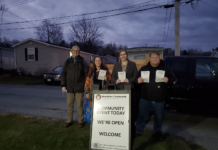FALL RIVER: A Fall River woman is urging Nova Scotia Health/MSI to help her get her life back with a procedure they currently don’t cover.
Diann Pick-Robertson had the majority of her pancreas removed in Dec. 2014 in Halifax, but ended up in constant pain following the surgery. Since then, she’s been referred to a specialist at Edmonton University Hospital who removed the remainder of her pancreas. The surgeon, Dr. Shapiro, can do a special surgery that will give Pick-Robertson her life back—but there’s one hitch, MSI doesn’t cover the costs.
“Now I’m living with no pancreas, which means I constantly take enzymes when I eat or drink; I have very little medical coverage, I can’t work and I’m living on $855 a month,” she told The Laker on Dec. 14. “I’m a diabetic. My insulin, the needles, the strips, food, enzymes. It’;s ridiculously hard.
“I’m on a waiting list because the next part of the procedure is called Islet transplant. If they get a pancreas that matches mine, they can take Islets from that one and put them into me, and it will develop itself and secrete insulin and enzymes and I will no longer be an insulin-dependent diabetic.”
She has been an insulin-dependent diabetic since she was 13-years-old. Pick-Robertson is now 56.
But there’s one hitch-Nova Scotia’s health care provider, MSI, will not cover the surgery.
That’s left Pick-Robertson with a decision to make. Move to Alberta, live there for three months before she can get a health card, stay another three to six months until the procedure can be performed and it’s successful, or wait for MSI.
“I need everybody on board, I need people to write MSI to get this pushed through that it’s more than an experiment, but that it should be covered by them,” said Pick-Robertson.
She said before she went out for the pancreas removal, she gave them letters about what she needed to have done. As she boarded the plane that day to head out, she received word it would not be covered.
Pick-Robertson said she is waiting until after the holidays to speak with Liberal MLA Bill Horne to see what help he may be able to provide her.
With her not being able to work and bringing in just $855 per month, it’s left not much wiggle room for her and best friend Nigel Thorpe, who Pick-Robertson says has been a Godsend for her during her ordeal.
There is a GoFundMe page setup to help raise money to help offset and cover some of the medical expenses that she has incurred. It can be found by going to www.GoFundMe.com and searching for Help Diann ditch the Pancreas. She is in the process of opening up a Trust Fund where donations can be accepted. That information had yet to be finalized on Dec. 14.
Pick-Robertson, her eyes welling up, said she doesn’t understand why MSI is having a problem saying the procedure she needs is okay and covered. She isn’t sure how much longer she can wait for MSI to make a decision.
Nigel “Jez” Thorpe, Pick-Robertson’s best friend, said they’re hoping to get all their ducks in a row to be ready for when the phone call may come. Usually it takes more than one attempt at the surgery to get it right—at a pop of $170,000 per attempt.
“Once the funding is there, we know that when she gets the call she will be okay to jump on a plane and go,” said Thorpe.
The big thing for the surgeon is he will only do it if it’s health care covered. That’s the only thing standing between Pick-Robertson’s life now and getting back to life before having the surgery to remove her pancreas.
“If MSI says ‘OK go it’s covered,’ and the phone would ring from Dr. Shapiro saying he had a pancreas ‘get out here,’ we’d be gone,” said Pick-Robertson. “It wouldn’t matter if it was Christmas Day, we’d be gone.
She has a simple plea to MSI.
“Help me,” said Pick-Robertson. “Money shouldn’t be the be-all. It’s my life.”
Tracy Barron, spokeswoman for the Department of Health and Wellness, didn’t add much hope for Pick-Robertson that decision would be any time soon.
“Islets cell transplants are not an insured service in Nova Scotia, or any Canadian province,” said Barron on Dec. 20 in an email. “Alberta has a mechanism for funding this program for Alberta residents although it is still technically an uninsured service.”
She did say more research is emerging around this procedure.
“But at this time, not enough clinical evidence exists for it to be considered as an insured service,” said Barron.
phealey@enfieldweeklypress.com








